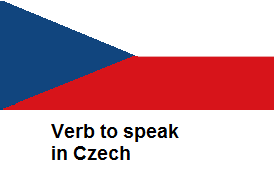Language/Czech/Grammar/Verb-to-speak-in-Czech
Here's a lesson on how to conjugate the verb "mluvit" (to speak) in Czech:
In Czech, the verb "mluvit" means "to speak." Like in any language, the verb changes depending on the subject and tense of the sentence. Here's how to conjugate it:
Present tense:
- Já mluvím (I speak)
- Ty mluvíš (you speak, informal)
- On/ona/ono mluví (he/she/it speaks)
- My mluvíme (we speak)
- Vy mluvíte (you speak, formal or plural)
- Oni/ony/ona mluví (they speak)
Past tense:
- Já jsem mluvil/mluvila (I spoke)
- Ty jsi mluvil/mluvila (you spoke, informal)
- On/ona/ono mluvil/mluvila (he/she/it spoke)
- My jsme mluvili/mluvily (we spoke)
- Vy jste mluvili/mluvily (you spoke, formal or plural)
- Oni/ony/ona mluvili/mluvily (they spoke)
Future tense:
- Já budu mluvit (I will speak)
- Ty budeš mluvit (you will speak, informal)
- On/ona/ono bude mluvit (he/she/it will speak)
- My budeme mluvit (we will speak)
- Vy budete mluvit (you will speak, formal or plural)
- Oni/ony/ona budou mluvit (they will speak)
Imperative (command form):
- Mluv! (Speak!, informal)
- Mluvte! (Speak!, formal or plural)
It's important to note that Czech has two grammatical genders, masculine and feminine, and the forms of the verb change depending on the gender of the subject. For example, "he speaks" is "on mluví" and "she speaks" is "ona mluví." In the plural form, the gender is determined by the majority of the group. If there are both masculine and feminine subjects in the group, the masculine form is used.
That's a basic overview of how to conjugate the verb "mluvit" in Czech. As with any language, practice makes perfect, so try using these forms in different sentences to get more comfortable with them.
.

